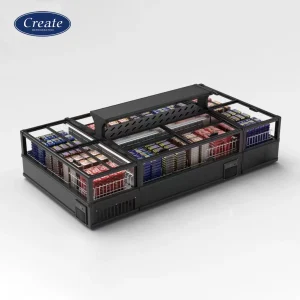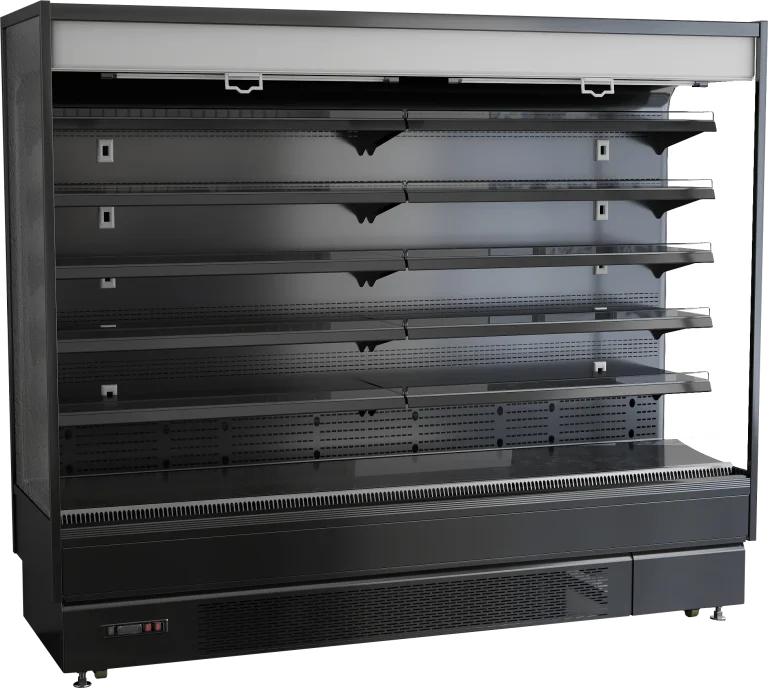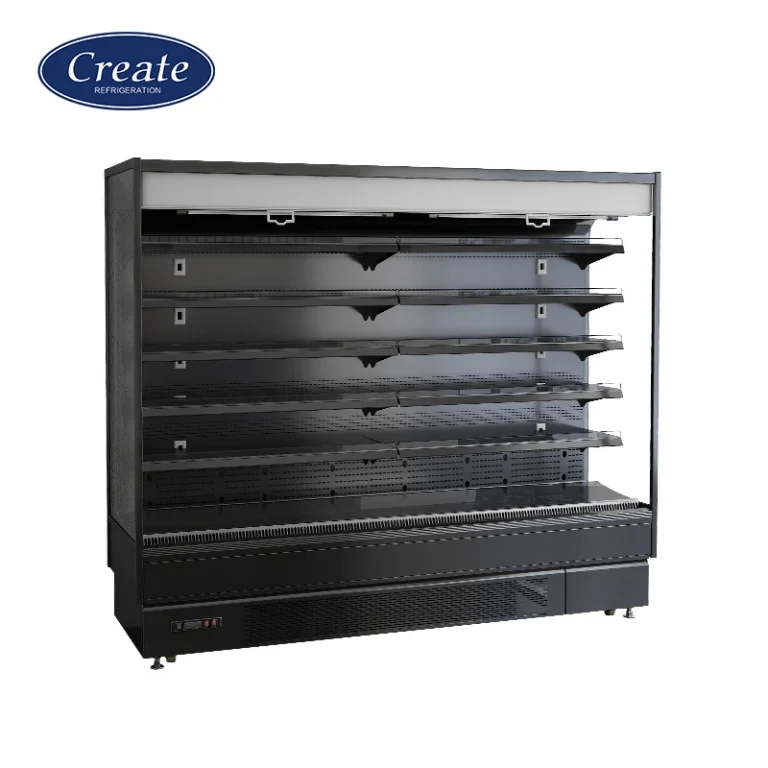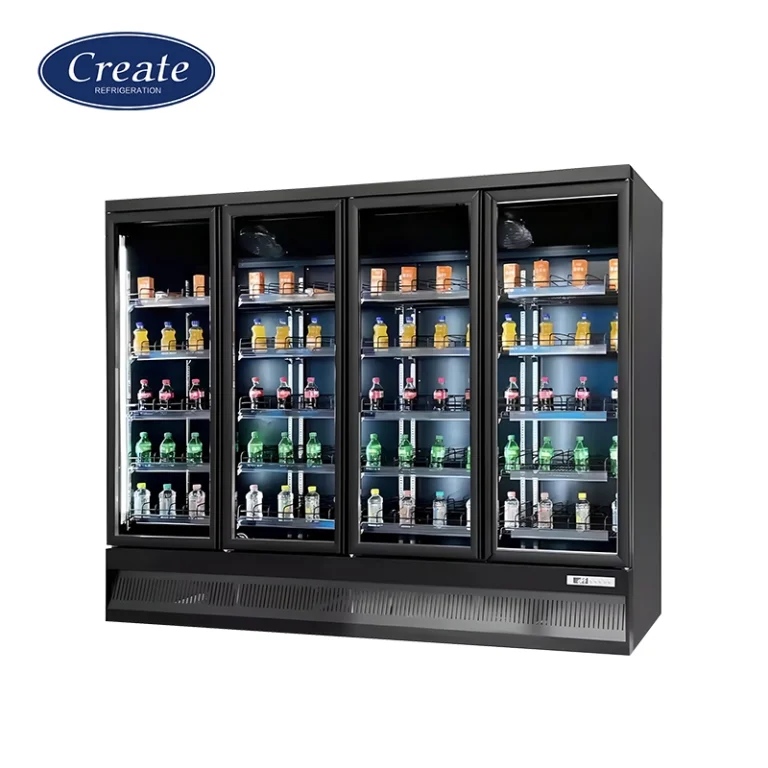When it comes to refrigeration systems used in settings like homes versus grocery stores or eateries, you might ponder if there’s a notable disparity between them all. Commercial refrigerators are built to withstand conditions in professional spaces compared to domestic fridges meant for personal use at home. In this blog, we’ll delve into the contrasting features of these refrigeration units. From their design and cooling methods to their functionalities to illuminate the distinctions.
Design and Structure Differences
The main contrasts between household refrigerators are often found in their design and build quality differences. Commercial fridges are usually larger and sturdier to endure regular use effectively, while domestic fridges are crafted to blend harmoniously into a residential kitchen.
Size and Capacity Variations
One major contrast lies in the size aspect. Fridges are considerably bigger than household refrigerators as they are designed to accommodate large amounts of food and beverages typically found in settings like grocery stores or restaurants. Conversely, domestic refrigerators have smaller capacities for storing items.
Space Utilization in Commercial Fridges
Commercial refrigerators are created to optimize space and simplify the organization of amounts of food items efficiently in various compartments with adjustable shelves and accessible open designs for convenient access to stored goods.
Compactness in Domestic Units
In comparison with refrigerators, bulkier size and capacity requirements for businesses or restaurants to store large quantities of food items efficiently and effectively with specialized features tailored to professional settings. Domestic refrigerators are crafted to be smaller in size and space-saving in design that can easily fit into the layout of a common kitchen or garage at home, providing practicality and convenience for everyday household use.
Material and Build Quality
The materials used in household refrigerators are quite distinct from each other in terms of construction quality and durability characteristics. Commercial fridges are constructed using top grade materials that are sturdy and long lasting to withstand rigorous daily usage. Domestic fridge models are crafted with materials suitable for home environments but may lack the robustness seen in commercial counterparts.
Cooling Mechanism and Efficiency
The way refrigerators cool in home settings varies a lot. They’re made to fit the needs of each environment they’re in.
Refrigeration Systems Used
Both kinds of refrigerators operate using coils that generate refrigeration. When the coils cool down and become cold enough to cause water vapor to condense and lower the temperature of the coils further as a result of this process taking place. A coolant is then circulated through pipelines within sealed compartments to preserve food at a temperature level. Nevertheless, commercial refrigerators come equipped with robust compressors and sophisticated systems designed to maintain constant temperatures while minimizing any negative impact on performance.
Cooling Mechanisms in Home Fridges
Household refrigerators are equipped with compressors that are not as powerful and are intended for sporadic operation rather than continuous use like industrial refrigeration systems do to be more energy efficient in the long run.
Efficiency Standards for Commercial Use
Commercial fridges nowadays are made to be more energy efficient compared to versions with features like better insulation and precise temperature settings for saving money in commercial settings.
Energy Usage in Domestic Settings
Household fridges are equipped with energy saving options and settings as well as specialized sections with varying temperature controls to prevent unnecessary cooling of certain items, such as fruits and veggies.
Functionality and Features
Commercial and domestic fridges have a variety of different functions and features that are tailored to their specific use cases. The features in commercial models are geared towards the needs of a business, while domestic refrigerators come with convenience features for home use.
Temperature Control and Range
Commercial refrigerators require temperature regulation to maintain the freshness and safety of food items they store, which is crucial for businesses in the food industry to ensure quality products for customers and compliance with safety standards.
Advanced Controls in Commercial Fridges
Commercial refrigerators frequently include digital temperature control systems for precise temperatures in preserving food quality and meeting health and safety standards. Furthermore, some commercial models may incorporate functions like defrosting to minimize maintenance requirements.
Basic Temperature Settings in Home Units
Household fridges usually come with settings to adjust the temperature for both the fridge and freezer sections that work well for everyday use at home. Although some household models offer advanced controls and features, they generally lack the precise control found in commercial fridges.
Additional Features and Accessories
Commercial and household refrigerators come with features tailored to specific requirements. Commercial units may include glass doors for easy visibility and specialized compartments for different foods, whereas household refrigerators typically offer adjustable shelves and door bins.
Maintenance and Longevity
It is important to take good care of your refrigerator, be it for home use, because different models usually differ in their manner of maintenance, given the design and purpose. This ensures that your appliance runs well.
Cleaning and Maintenance Requirements
Like all refrigerators, commercial and household ones, these need periodic cleaning and maintenance to perform and last. Generally speaking, the interior of your refrigerator needs regular cleaning.
Preventive Maintenance of Commercial Refrigerators
The refrigerator needs regular and proper maintenance service in places where restaurants or cafes have them running all the time. It should be cleaned at least once a week to maintain its efficiency. The dust and dirt on the grills should be cleaned with brushes and then a gentle session of vacuuming should be done. This would include cleaning both interior and exterior with water added to a mild detergent, then wiping down with a clean cloth to finish. Also, remember to check on temperature and look for any signs of wear or damage around the door seals.
Simplified Care for Home Units
Household fridges need cleaning often than commercial ones do; however, you should still make sure to maintain all parts of the appliance properly. Routine cleaning of the area and inspecting the door seals as well as cleaning the coils with a vacuum cleaner are all key aspects of upkeep. Even though the maintenance tasks are simpler for refrigerators compared to commercial ones, it’s crucial to provide regular care for their proper functioning.
Expected Lifespan
While domestic ones have their best life, commercial refrigerators do have a lifetime, considering factors of design and durability such as brand reputation and maintenance routines that could affect how long they would serve under different conditions and usages. Domestic refrigerators can also last for several years, even though they might not be that strong in contrast to commercial ones, regarding resistance to wear and tear.
Longevity of Commercial Equipment
Commercial refrigerators are constructed using high-quality materials to enhance their life cycles. The life elongation for them is also attained during the operations through diligent maintenance and operations together with timely fixes whenever needed. Operating conditions of a refrigerator too influence the life cycle it shall have for service.
Lifespan of Domestic Appliances
House fridges might not be resilient like some, but with good care and proper use, they can also go a long way in longevity. It is essential to adhere to the care instructions and maintenance set by the manufacturer for the longevity of one’s home fridge.
Cost Considerations
When selecting a refrigerator to buy, it’s important to take into account the expenses linked with each kind. Commercial refrigerators tend to have an initial cost because of their larger size, sturdy build and advanced functions, while residential models are generally more budget friendly at the time of purchase.
Initial Purchase Price
The price of a refrigerator at the start is notably higher compared to that of a household refrigerator due to its larger size and the use of sturdier materials along with advanced cooling mechanisms in place. Household refrigerators are intended to be budget friendly for homes and’re available in various price ranges based on their features and size.
Long-Term Operational Costs
When looking at buying something and thinking about long term costs like energy and upkeep expenses for operation are key factors to consider beyond just the purchase price itself. Commercial units tend to use energy because of their larger size and power requirements; however, new models with energy saving capabilities can help cut down these expenses. Household models are made to be energy efficient from the start, but older versions may lead to higher utility bills.
Create Refrigeration: Your Trusted Fridges Supplier
Create Refrigeration is a name trusted for reliable commercial refrigeration equipment, as it offers diversified products to satisfy the needs of every business type. With its 25-year experience and assurance of quality, it provides commercial fridges with strong construction, powerful cooling systems and options of customization. This includes display refrigerators, storage freezers and specialized units for various uses. The products include energy-efficient designs and components from trusted brands, making it a reliable choice for any business seeking high-quality commercial refrigeration solutions.
FAQs
1. Can I use a commercial fridge at home?
Sure thing! But it might generate more noise and consume extra energy than standard home fridges while also needing more space for ventilation.
2. Are the warranties for refrigerators longer than those for residential refrigerators?
Commercial refrigerators have extended warranties that differ depending on the brand and model you choose to go with. It’s best to reach out to the manufacturer for precise warranty information.
3. Why do commercial fridges have fans inside?
Commercial fridges rely on built-in fans to maintain an airflow and even temperatures throughout the entire unit to keep perishable items fresh in commercial environments.






















